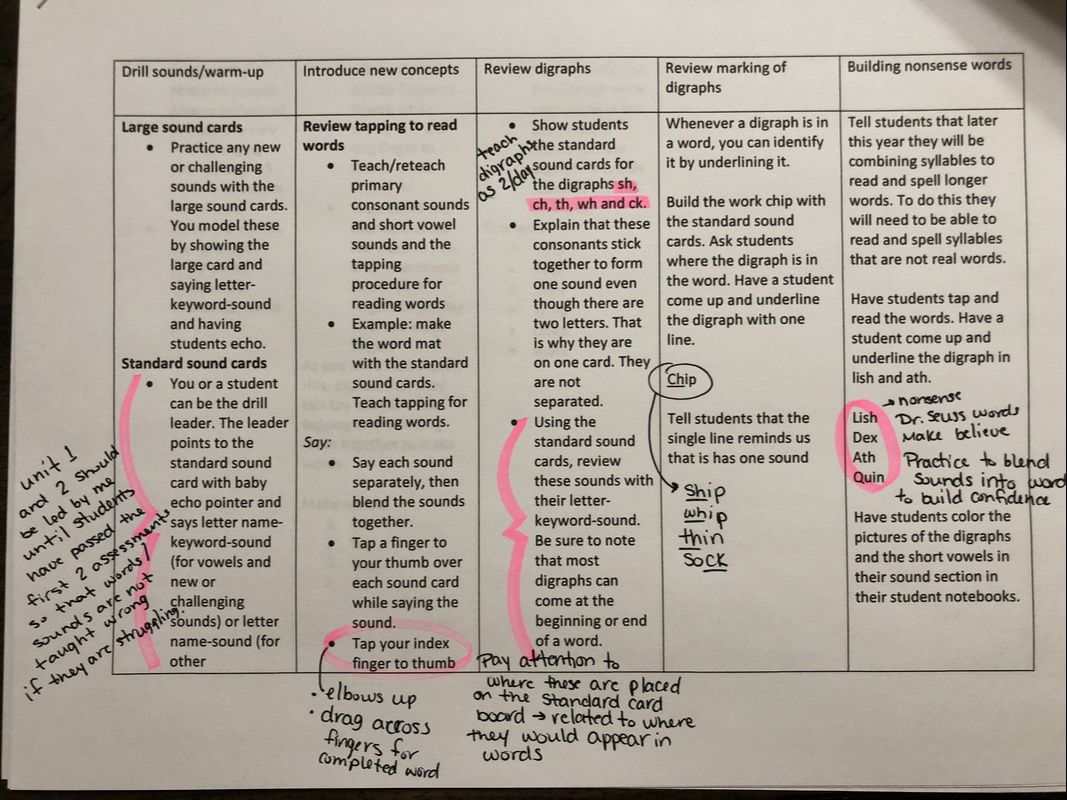Unit Planning
InTASC Standard #7: The teacher plans instruction that supports every student in meeting rigorous learning goals by drawing upon knowledge of content areas, curriculum, cross-disciplinary skills, and pedagogy, as well as knowledge of learners and the community context.
Going through each unit, there are trends as the units get more complex. During the first unit of planning, there are trends over practice what would be considered "review" for students who have already completed Fundations in a previous grade. However, these are new concepts for students who have not used these type of phonics program and intervention. It is vital, in the unit planning, that this is taken into consideration. As I go through the unit planning, I am able to use pre-assessment date to find those students who have an idea of what we are going to be learning and use them as student leaders in the classroom. This also gives me an idea when I am unit planning where I may need to spend more time and which students need additional supports.
Below, is a unit plan for the first unit of teaching. Although this unit is planned out for me, I am able to pull out what I need and create additional tasks that benefit students when we are working whole group, in stations and when they are working in a small group with me. As I plan the unit and review the pre-assessments, I am able to discover who will most likely need additional Funations intervention and what reteach lessons I will need to create for the unit. I know that all students do not perform on the assessments and that is where planning can be adapted as they make progress throughout the unit.
Below, is a unit plan for the first unit of teaching. Although this unit is planned out for me, I am able to pull out what I need and create additional tasks that benefit students when we are working whole group, in stations and when they are working in a small group with me. As I plan the unit and review the pre-assessments, I am able to discover who will most likely need additional Funations intervention and what reteach lessons I will need to create for the unit. I know that all students do not perform on the assessments and that is where planning can be adapted as they make progress throughout the unit.
At the end of each unit, there are a couple pages of resources that you will need to use for the entire unit. This is one piece of evidence that backwards planning is really where I need to begin. If I did not start at the back of the unit, I would not know which words or sentences I needed to be focused on when I pulled them for classwork. It also shows me the copy of the test and how I need to be scoring their pre-assessment and post-assessment for the unit.
Above is an annotated version of my unit plan. Knowing my students, allows me to know where to focus within the unit and which areas my students know. Not only does it allow me to break down the unit for whole group instruction, but allows me to form my small groups that need additional supports and what I should be looking for moving forward. By annotating and looking at the unit plan, I am able to take the time to create a differentiated and specific lesson plan for my students. I am able to listen and see what my students have or have not mastered in order to create intervention groups and what needs to be taught whole group versus small group.
Conclusion:
Part of planning as a teacher is understanding what the goal of the unit is and what students need to achieve in order to be successful. Knowing how to break down the unit plans is crucial to the success of my students from unit to unit, but also long term through level 2 of Fundations. Breaking down and planning for units allows me to prepare and differentiate for my students throughout the entire year. It makes the year break down and understand what students need to master and allowing time for what they need more support in and what they may be over to simply browse through. This is not only important for Fundations, but also for planning information throughout the year in all subjects. Fundations provides a baseline of planning and gives me the opportunity to do the best for my students at any given moment.
